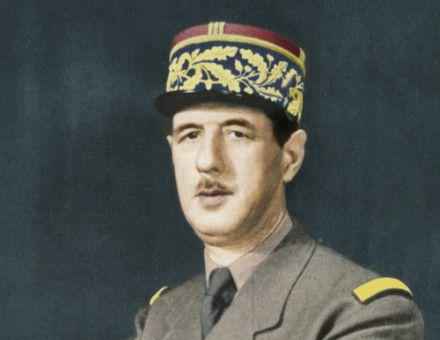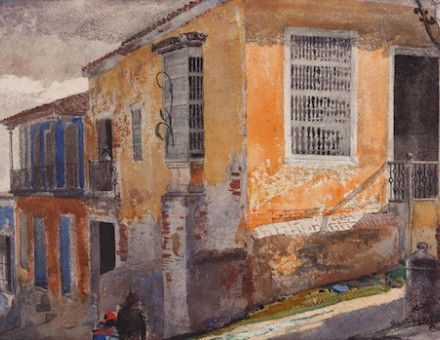The Fall of Kano
The taking of Kano by the West African Frontier Force, on February 3rd 1903, signalled the end of the Muslim fundamentalist Fulani empire in northern Nigeria.
 The taking of Kano by the West African Frontier Force signalled the end of the Fulani empire in West Africa. The Fulani people were nomadic cattle-herders and fierce horsemen, who in the early 1800s, imbued with zeal for Islam, established a fundamentalist Muslim state among the Hausas in northern Nigeria under their leader Uthman dan Fodio, Commander of the Faithful. His successors were Sultans of Sokoto, the empire’s spiritual centre to the west of Kano. The empire of emirates owing obedience to the sultan was in decline by the 1880s, when the British, French and German governments began seriously to carve up the interior of West Africa between them. It took them twenty years or so, during which they stopped the slave trade and human sacrifice while encouraging Christian missionary work. A key figure was a forceful British colonial administrator, Frederick Lugard. After experience in India and East Africa, he was in his mid-thirties in 1894 when he was approached by Sir George Goldie, head of the Royal Niger Company, which, to the annoyance of the French, had seized control of the River Niger with its own fleet of twenty gunboats. Goldie recruited Lugard in a race against the French to sign a trading agreement with a key chief in the interior. He was successful, at the cost of a poisoned arrow in the head. In 1897 Joseph Chamberlain commissioned Lugard to raise and train the new West African Frontier Force, recruited from the local tribes, with British officers. Three years later the government terminated the Royal Niger Company’s contract and established separate protectorates over northern and southern Nigeria, with Lugard in charge of 300,000 square miles in the north, still largely unexplored by Europeans. Under the principles agreed at a conference in Berlin in 1885, it was necessary for a colonial power not merely to announce that it had taken over a particular region, but to establish a visible administration there. Other imperialists would then back politely away. British dominance of northern Nigeria was far more theoretical than real in 1900, but Lugard proceeded to make it a reality, more by bargaining and diplomacy with the local rulers than by force. His principle was always that colonial power was best exercised indirectly, through the local chiefs and structures already in place.
The taking of Kano by the West African Frontier Force signalled the end of the Fulani empire in West Africa. The Fulani people were nomadic cattle-herders and fierce horsemen, who in the early 1800s, imbued with zeal for Islam, established a fundamentalist Muslim state among the Hausas in northern Nigeria under their leader Uthman dan Fodio, Commander of the Faithful. His successors were Sultans of Sokoto, the empire’s spiritual centre to the west of Kano. The empire of emirates owing obedience to the sultan was in decline by the 1880s, when the British, French and German governments began seriously to carve up the interior of West Africa between them. It took them twenty years or so, during which they stopped the slave trade and human sacrifice while encouraging Christian missionary work. A key figure was a forceful British colonial administrator, Frederick Lugard. After experience in India and East Africa, he was in his mid-thirties in 1894 when he was approached by Sir George Goldie, head of the Royal Niger Company, which, to the annoyance of the French, had seized control of the River Niger with its own fleet of twenty gunboats. Goldie recruited Lugard in a race against the French to sign a trading agreement with a key chief in the interior. He was successful, at the cost of a poisoned arrow in the head. In 1897 Joseph Chamberlain commissioned Lugard to raise and train the new West African Frontier Force, recruited from the local tribes, with British officers. Three years later the government terminated the Royal Niger Company’s contract and established separate protectorates over northern and southern Nigeria, with Lugard in charge of 300,000 square miles in the north, still largely unexplored by Europeans. Under the principles agreed at a conference in Berlin in 1885, it was necessary for a colonial power not merely to announce that it had taken over a particular region, but to establish a visible administration there. Other imperialists would then back politely away. British dominance of northern Nigeria was far more theoretical than real in 1900, but Lugard proceeded to make it a reality, more by bargaining and diplomacy with the local rulers than by force. His principle was always that colonial power was best exercised indirectly, through the local chiefs and structures already in place.
By 1902, however, he found it necessary to subdue the principal Fulani emirates. The colonial office was opposed to the use of force, but Lugard was not a man to be constrained by Whitehall. Kano was a major trading centre with a flourishing slave market, defended by mailed horsemen and protected by walls up to 40ft thick and 50ft high. Lugard sent against it a Frontier Force detachment of some 700 African soldiers, their British officers, four artillery pieces and four machine guns. They were led by Colonel T.L.N. Morland, an adventurous Canadian officer (he ended up as General Sir Thomas Morland). The defenders fired from the walls, but the artillery breached a gate and when the storming party formed up, the defenders departed, leaving the city to be taken. The population seemed either unconcerned or positively relieved and the British emptied the town’s noxious jail, which was so small and crowded that prisoners were regularly trampled to death. The Frontier Force went on to take Sokoto the following month after the reigning sultan, Attahiru, had fled. The British installed his brother in his place and caught up with Attahiru, who was cut down by a stray bullet during a skirmish. The Fulani were between a rock and a hard place. Even if they stopped the British, they would be promptly invaded by the French. They made terms with Lugard, who confirmed the emirs in office when they agreed to be guided by British Residents in future. There was to be no interference with Islamic religion and law, but slave trading was banned and domestic slavery was to be phased out. There was more trouble with some of the Fulani emirs, but by 1906 Lugard was fully in control and in 1914 northern and southern Nigeria were merged into Britain’s largest African colony, with Sir Frederick Lugard as Governor-General. In 1922 he wrote: ‘For two or three generations we may show the Negro what we are: then we shall be asked to go away. Then we shall leave the land to those it belongs to, with the feeling that they have better business friends in us.’




